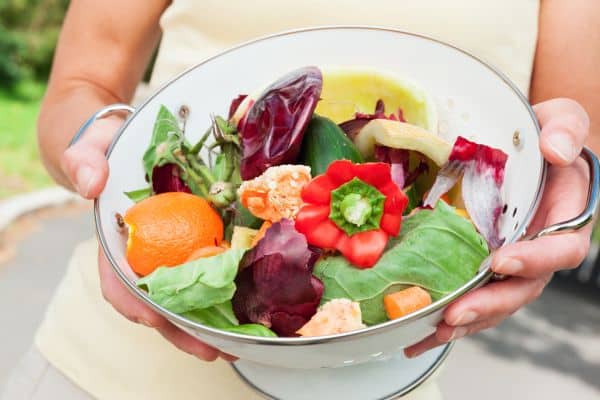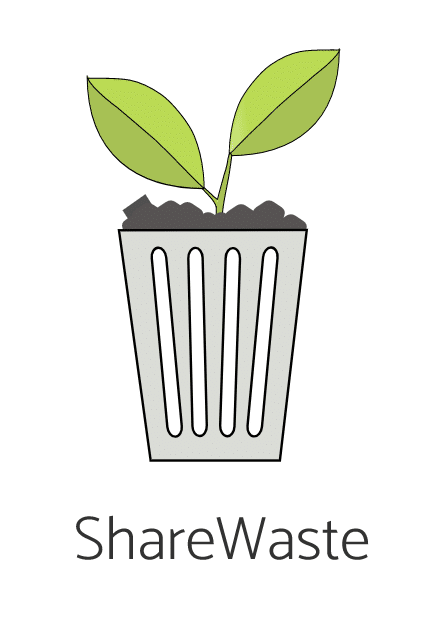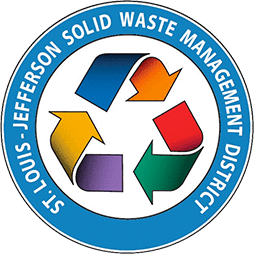The first full week in May is International Compost Awareness Week. It is estimated that every year 125 to 160 billion pounds of food is wasted. This equates to 238 pounds of food per person, per year. Only 5% of food scraps make it to a compost pile, resulting in a lot of wasted valuable material.

This used to be banana peels and apple cores!
Landfilling Food Scraps
Food scraps, much like recyclables, still have a valuable purpose, but when landfilled, their usefulness cannot be utilized. Needless to say valuable space is being taken up in the landfill when there is an alternative, beneficial use for food scraps. It is estimated that 22% of our landfills consist of food waste which is more “than any other single material in our everyday trash” and 40% of the food going to the landfill is still edible. Fruit, veggies and mixed food dishes make up about 39% of food waste, with dairy and meat making up the second and third primary areas of food waste.
Some believe that it doesn’t make a difference if you throw food scraps in a landfill versus a compost pile because they think the scraps will break down. This is not necessarily the case, in a landfill materials undergo anaerobic decomposition. This means because waste is buried, it does not receive oxygen, but creates methane gas during anaerobic decomposition. Very little decomposition happens through this method. Compost piles regularly need oxygen in order to break down material through aerobic decomposition. Foods scraps will fully break down in a compost pile. This is done either through turning the compost pile or through the use of worms and other living organisms producing carbon dioxide instead of methane.
When food scraps are landfilled, they create methane gas which is a harmful greenhouse gas that is at least 25 times more powerful than carbon dioxide. This means that is it more effective at trapping radiant heat than carbon dioxide making “landfills the 3rd largest source of human-caused greenhouse gases in the U.S.” Our landfills produce 17% of all U.S. methane emissions. While some landfills capture methane gas to use it as energy, many studies show most methane gas is released from landfills before it can be captured. In fact, in the first 2-4 weeks is when most landfilled food scraps decay and methane gas is released into the atmosphere.
Benefits of Composting
Once you start practicing compost, it is hard to remember a life before composting! You are putting food scraps, like fruit peels and coffee grounds, back to good use. By making compost, you will save money on fertilizers, trash and yard waste pick ups and the gym (you will get your workout turning your compost pile!).

If you have a garden and use compost regularly, the benefits surpass the cost of the compost. Here are some of the many benefits of compost:
- Compost maintains water retention when mixed with soil
- Compost feeds plants and thus the plants produces more and grow larger
- Compost regulates temperature better when added to soil
- Compost returns valuable nutrients to the soil to maintain soil fertility
- Compost is a slow releasing natural fertilizer
- Compost enriches plants making them less susceptible to damage from pests and disease
- Compost provides air circulation in the soil for plants roots
- Compost neutralizes soil, thus preventing it from becoming too acidic or too alkaline
- Compost prevents erosion because the soil is able to hold water effectively

Who knew the benefits to your food scraps were so valuable?! Even if you don’t have a garden or a space to compost, people will happily take your food scraps off your hands. Usually gardeners need more scraps than they can create. ShareWaste is a free phone app that connects you with people who are looking to either provide or collect food scraps for residential composting. If taking your food scraps to someone is not an option, consider New Earth Farms composting services and is available to the St. Louis Metro Area at a reasonable price! Perennial City Composting picks up from your home in St. Louis city and parts of St. Louis county. If you are looking to start your own compost pile, read our blog post about How To Build Your Own Compost Pile.
Other Resources
Watch the compost story by Kiss the Ground!
More information on how to compost.
Creating the Best At-Home Composting System
Prepping and storing food properly extend the shelf life of your food to prevent creating food waste at the start. Here are some tips to help food last longer. The FoodKeeper App was developed by the USDA to help you understand how to store food and beverages to maximize freshness.
If you are a larger scale business or restaurant and interested on composting, St. Louis Composting and Total Organics Recycling.











4 Comments
Do you ever do consulting visits? We have a compost that we started this year. I would love to know what I’m doing right and what I could do better!
We do not provide consulting services, but maybe reach out to Perennial City Composting or Gateway Greening.
Thank You for this info- very timely – I just bought a compost spinner container- looking forward to learning what I. An and can’t include. I know No animal bi products, but are egg shells okay?? Looking forward to minimizing my unhealthy gas (methane?) footprint and learning from your resources
Good question! Traditionally for home compost meat, cheese and oil should be avoided simply because pests could get into the compost pile. Some commercial composter accept these items because the have a lot of material and it get hot enough to break down faster and pests are not an issue. Egg shells are a great addition to add to your compost pile! If you are looking what to include or not include in your compost pile, we have another post that dives into this further: https://stlcityrecycles.com/compost-for-earth-month/
3 Trackbacks